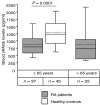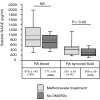Decreased levels of soluble receptor for advanced glycation end products in patients with rheumatoid arthritis indicating deficient inflammatory control
- PMID: 15987483
- PMCID: PMC1175032
- DOI: 10.1186/ar1749
Decreased levels of soluble receptor for advanced glycation end products in patients with rheumatoid arthritis indicating deficient inflammatory control
Abstract
The receptor for advanced glycation end products (RAGE) is a member of the immunoglobulin superfamily being expressed as a cell surface molecule and binding a variety of ligands. One of these ligands is high-mobility group box chromosomal protein 1, a potent proinflammatory cytokine, expression of which is increased in synovial tissue and in synovial fluid of rheumatoid arthritis (RA) patients. The interaction of high-mobility group box chromosomal protein 1 with cell-surface RAGE leads to an inflammatory response. In contrast, the presence of soluble RAGE (sRAGE) may abrogate cellular activation since the ligand is bound prior to interaction with the surface receptor. Our aim was to analyse to what extent sRAGE is present in patients with chronic joint inflammation (RA) as compared with patients with non-inflammatory joint disease and with healthy subjects, and to assess whether there is an association between sRAGE levels and disease characteristics. Matching samples of blood and synovial fluid were collected from 62 patients with RA with acute joint effusion. Blood from 45 healthy individuals, synovial fluid samples from 33 patients with non-inflammatory joint diseases and blood from six patients with non-inflammatory joint diseases were used for comparison. sRAGE levels were analysed using an ELISA.RA patients displayed significantly decreased blood levels of sRAGE (871 +/- 66 pg/ml, P < 0.0001) as compared with healthy controls (1290 +/- 78 pg/ml) and with patients with non-inflammatory joint disease (1569 +/- 168 pg/ml). Importantly, sRAGE levels in the synovial fluid of RA patients (379 +/- 36 pg/ml) were lower than in corresponding blood samples and correlated significantly with blood sRAGE. Interestingly, a significantly higher sRAGE level was found in synovial fluid of RA patients treated with methotrexate as compared with patients without disease-modifying anti-rheumatic treatment.We conclude that a decreased level of sRAGE in patients with RA might increase the propensity towards inflammation, whereas treatment with methotrexate counteracts this feature.
Figures





Comment in
-
Soluble RAGE: a hot new biomarker for the hot joint?Arthritis Res Ther. 2005;7(4):142-4. doi: 10.1186/ar1764. Epub 2005 Jun 3. Arthritis Res Ther. 2005. PMID: 15987496 Free PMC article.
Similar articles
-
Synovial fluid expression of autoantibodies specific for RAGE relates to less erosive course of rheumatoid arthritis.Rheumatology (Oxford). 2007 Aug;46(8):1367-71. doi: 10.1093/rheumatology/kem141. Epub 2007 Jun 14. Rheumatology (Oxford). 2007. PMID: 17569744
-
Soluble receptor for advanced glycation end products triggers a proinflammatory cytokine cascade via beta2 integrin Mac-1.Arthritis Rheum. 2006 Dec;54(12):3898-907. doi: 10.1002/art.22217. Arthritis Rheum. 2006. PMID: 17133598
-
Association of the Gly82Ser polymorphism in the receptor for advanced glycation end products (RAGE) gene with circulating levels of soluble RAGE and inflammatory markers in nondiabetic and nonobese Koreans.Metabolism. 2007 Feb;56(2):199-205. doi: 10.1016/j.metabol.2006.09.013. Metabolism. 2007. PMID: 17224333
-
Soluble receptor for advanced glycation end products: a new biomarker in diagnosis and prognosis of chronic inflammatory diseases.Rheumatology (Oxford). 2009 Oct;48(10):1190-6. doi: 10.1093/rheumatology/kep199. Epub 2009 Jul 9. Rheumatology (Oxford). 2009. PMID: 19589888 Review.
-
RAGE: therapeutic target and biomarker of the inflammatory response--the evidence mounts.J Leukoc Biol. 2009 Sep;86(3):505-12. doi: 10.1189/jlb.0409230. Epub 2009 May 28. J Leukoc Biol. 2009. PMID: 19477910 Review.
Cited by
-
The Circulating Level of Soluble Receptor for Advanced Glycation End Products Displays Different Patterns in Ulcerative Colitis and Crohn's Disease: A Cross-Sectional Study.Dig Dis Sci. 2015 Aug;60(8):2327-37. doi: 10.1007/s10620-015-3619-7. Epub 2015 Mar 11. Dig Dis Sci. 2015. PMID: 25757448
-
Relevance of Receptor for Advanced Glycation end Products (RAGE) in Murine Antibody-Mediated Autoimmune Diseases.Int J Mol Sci. 2019 Jul 1;20(13):3234. doi: 10.3390/ijms20133234. Int J Mol Sci. 2019. PMID: 31266174 Free PMC article.
-
Soluble receptor for advanced glycation end products in COPD: relationship with emphysema and chronic cor pulmonale: a case-control study.Respir Res. 2011 Mar 30;12(1):37. doi: 10.1186/1465-9921-12-37. Respir Res. 2011. PMID: 21450080 Free PMC article.
-
Role of Advanced Glycation End Products as New Biomarkers in Systemic Lupus Erythematosus.Int J Mol Sci. 2024 Mar 5;25(5):3022. doi: 10.3390/ijms25053022. Int J Mol Sci. 2024. PMID: 38474267 Free PMC article.
-
The RAGE Axis: A Relevant Inflammatory Hub in Human Diseases.Biomolecules. 2024 Mar 28;14(4):412. doi: 10.3390/biom14040412. Biomolecules. 2024. PMID: 38672429 Free PMC article. Review.
References
-
- Drinda S, Franke S, Ruster M, Petrow P, Pullig O, Stein G, Hein G. Identification of the receptor for advanced glycation end products in synovial tissue of patients with rheumatoid arthritis. Rheumatol Int. 2004. Mar 26. - PubMed
-
- Hou FF, Jiang JP, Guo JQ, Wang GB, Zhang X, Stern DM, Schmidt AM, Owen WF., Jr Receptor for advanced glycation end products on human synovial fibroblasts: role in the pathogenesis of dialysis-related amyloidosis. J Am Soc Nephrol. 2002;13:1296–1306. doi: 10.1097/01.ASN.0000013702.73570.3B. - DOI - PubMed
Publication types
MeSH terms
Substances
LinkOut - more resources
Full Text Sources
Medical
Research Materials

